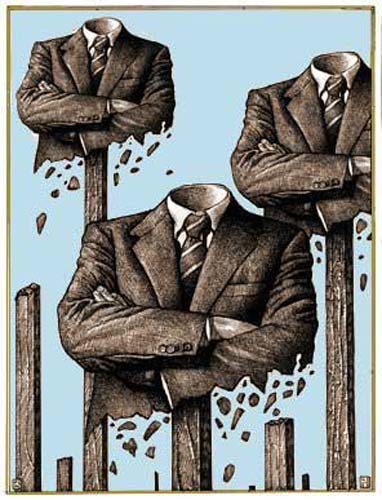
We can't help responding to the way we see others --- for better or for worse
Here's a no-brainer.
You want to improve your basketball game. Would you rather practice one-on-one with your older brother, who's on the JV team, or with Kobe Bryant?
Unless you possess a serious streak of masochism, you did not choose Kobe Bryant -- for reasons that should be obvious: while you will definitely improve playing with someone marginally better than yourself, you will accomplish nothing by playing with someone exponentially better than you are. Except, in all likelihood, the rapid deflation of your self-esteem.
Applying this principle more broadly, it's easy to see how associating with peers slightly better than ourselves -- whether academically, professionally, or morally -- will push us to higher levels in our own conduct and performance. But the benefits of implied social pressure disappear when we perceive our peer group to be functioning on a higher level than it actually is.
In an interview with NPR's Shankar Vedantam, Professor Todd Rogers of public policy at Harvard Kennedy School described his study of 5000 students required to grade one another's work in a massive open online course. Since the students were paired up at random, it was inevitable that some average students ended up grading the work of some exceptional students. Those students were significantly more likely to drop out of the course.
THROUGH A GLASS, DARKLY
Professor Rogers explains the phenomenon call "reference bias," whereby students assumed that their small sampling of students represented the group as a whole. Although my reference group may be a small group, or even a single person, I'm still likely to draw assumptions about the group as a whole, leading me to make decisions based on a faulty premise. In this case, students concluded that they couldn't handle the competition, even though they themselves were perfectly average.
This can lead to some unsettling implications when applied to the way media outlets report the news. If headlines are filled with violence, we naturally assume society in general is becoming more violent, and we more easily lose our sensitivity to violent behavior. Similarly with embezzlement, profanity, political integrity, and social trends with respect to gender-roles and marriage. It shouldn't be surprising that the values of society are now in free-fall, following the predilections of the entertainment and the news industries.
The same phenomenon might work positively, but then again it might not. The perception that energy conservation and voter turnout are on the rise could motivate me to become more energy conscious and more politically aware. On the other hand, if the stories of workplace violence and white collar crime are only offset by extraordinary acts of virtue, like a Mother Teresa retrospective or the seminary student who returned $98,000 found stashed away in a second-hand desk, then I might presume that virtuous people are few and far between. Even worse, I might conclude that true virtue is so far beyond my reach that it's pointless to try making the effort to be good.
THE GOOD, THE BAD, AND THE UGLY
No one can rationally dispute that the fabric of civil society is rapidly coming unravel amidst this year's presidential campaign. In the wake of primary victories by a candidate on one side who is the most brazenly corrupt ever and a candidate on the other who is the most undisciplined, unpredictable, and unrefined, it's easy for a disgusted and weary electorate to conclude that honesty, integrity, and civility have vanished as American cultural values.
One might argue that the accelerating nosedive of Donald Trump in the polls suggests that there are depths of personal behavior that Americans still cannot condone. But the Republican nominee has dropped the bar for personal conduct so low that it's hard to imagine any future candidate ever sinking to such depths, no matter how uncouth. Indeed, primary races across the country have sunk deeper than ever into the mud as a natural outcome of the Donald Trump Effect.
And, on the flip side, a willingness to overlook Hillary Clinton's arrogance and utter disregard for both legal and moral boundaries makes us all more insensitive to the finer qualities of honesty and integrity.
None of this bodes well for us or our children. One can only hope that Libertarian candidate Gary Johnson will scoop up the necessary 15% in the polls to qualify for participation in the presidential debates. He may not be a perfect or a charismatic candidate, but he projects a certain amount of character and competence, which is what we desperately need.
Maybe, just maybe, if the electorate has a chance to see how a proper statesman conducts himself, we will collectively remember what we as a nation stand for… not to mention what we should be willing to stand.
Rabbi Yonason Goldson is a professional speaker and trainer. Drawing upon his experiences as a hitchhiker, circumnavigator, newspaper columnist, high school teacher, and talmudic scholar, he teaches practical strategies for enhancing communication, ethical conduct, and personal achievement. He is the author of Proverbial Beauty: Secrets for Success and Happiness from the Wisdom of the Ages is available on Amazon.
Comment by clicking here.


 Contact The Editor
Contact The Editor
 Articles By This Author
Articles By This Author
